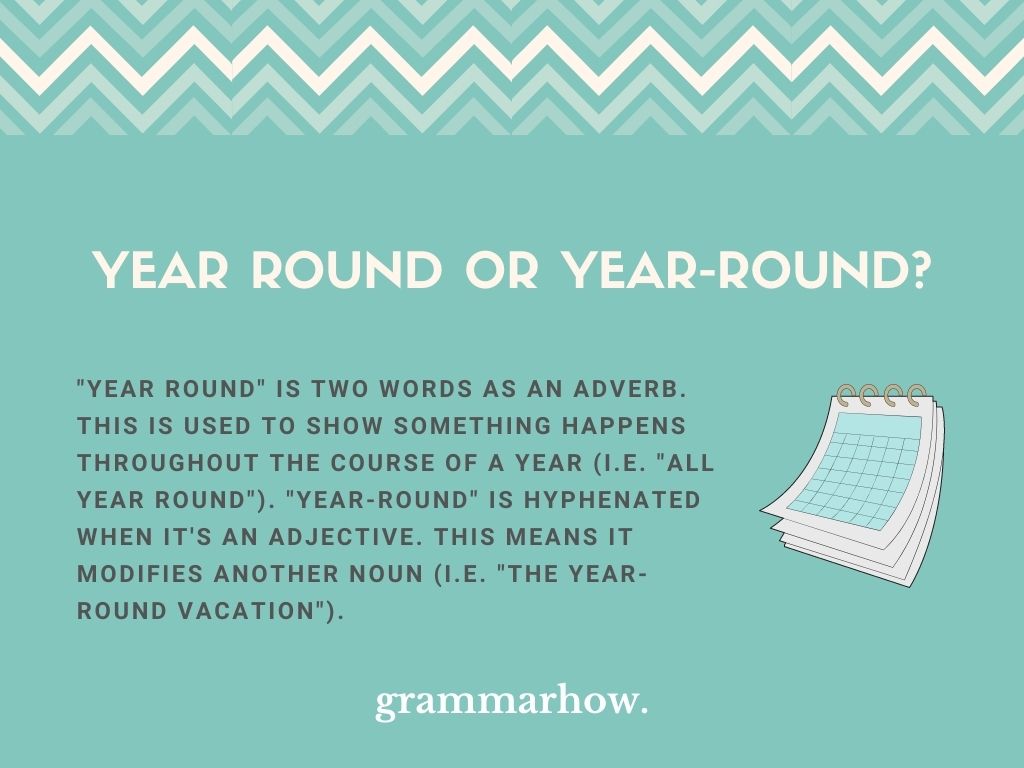“Year round” is an adverb or adjective, depending on the context. These forms are written differently (one with and one without a hyphen). You might already know that, but you might not know which is which.
We’ll get to the bottom of the hyphen rules associated with “year-round.”
Year round or Year-round?
“Year round” is two words as an adverb. This is used to show something happens throughout the course of a year (i.e. “all year round”). “Year-round” is hyphenated when it’s an adjective. This means it modifies another noun (i.e. “the year-round vacation”).

The main difference here is the modification used with the adjective form.
You should refer to AP Style when figuring out how hyphens work. According to AP Style, multiple words are hyphenated when they modify the same noun that comes after it in a written sentence.
Therefore, you should hyphenate “year” and “round” when they modify the following noun (i.e. “year-round trip”). This happens to clearly show the reader what “year-round” means.
Without the hyphen, you’re left with “year round trip.” This means only “round” modifies “trip,” implying that someone took a circular trip. “Year” cannot modify “trip” because it is not included in the hyphen.
Is “Year-round” Hyphenated?
“Year-round” is an adjective. Adjectives modify other nouns to give them a description of some kind. You should use “year-round” with a hyphen when it directly modifies another noun that comes after it.
You should hyphenate multiple words when they modify the same noun. This allows a reader to understand where the modification comes from. The AP Stylebook establishes these rules, claiming that hyphens are linkers between common compound adjectives.
- I will need him to take a year-round trip to figure this out. He needs to immerse himself in them.
- It’s not for year-round use. There are some months that I would suggest leaving it indoors.
Is “Year round” Two Words?
“Year round” is not an adjective. As two words, “year round” is an adverb, meaning that something happens throughout the year.
Adverbs modify other verbs to show how different actions occur:
- I wanted it year round because I knew it was going to help us.
Here, “wanted” is modified by “year round.” This means it’s an adverbial form, meaning that it should be two words rather than hyphenated.
Adverbs may also modify other adjectives. This applies in certain situations with “year round” too:
- It was open all year round for visitors to come along and see it.
This time, “open” is modified to show that something was open for a full year. “Year round” is still unhyphenated to show it is an adverb modifying “open.”
Year-Round or Year-round?
There are two contradicting ideas when capitalizing “year-round” in a title.
AP Style suggests leaving “round” lowercase, meaning “Year-round” is the correct way to capitalize the word. This works because the hyphen treats the two words as one, meaning only the first letter in “year” needs a capital letter.
Other style guides, such as APA Style and Chicago Style, suggest otherwise. These styles say that “Year-Round” is correct with both words capitalized. Despite the hyphen, “year” and “round” still need to be treated as two separate words.
These rules only apply to the hyphen form. “Year Round” should always be written capitalized when it is two separate words.
Conclusion
“Year-round” is an adjective form. You may include the hyphen when “year” and “round” modify the same noun in your writing. The noun likely comes directly after “year-round” In this form.
“Year round” is an adverbial form. When modifying verbs or adjectives, you should write them as two words to show how long something lasts.

Martin holds a Master’s degree in Finance and International Business. He has six years of experience in professional communication with clients, executives, and colleagues. Furthermore, he has teaching experience from Aarhus University. Martin has been featured as an expert in communication and teaching on Forbes and Shopify. Read more about Martin here.
